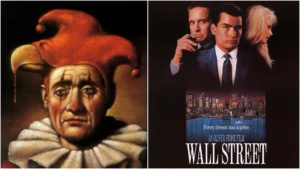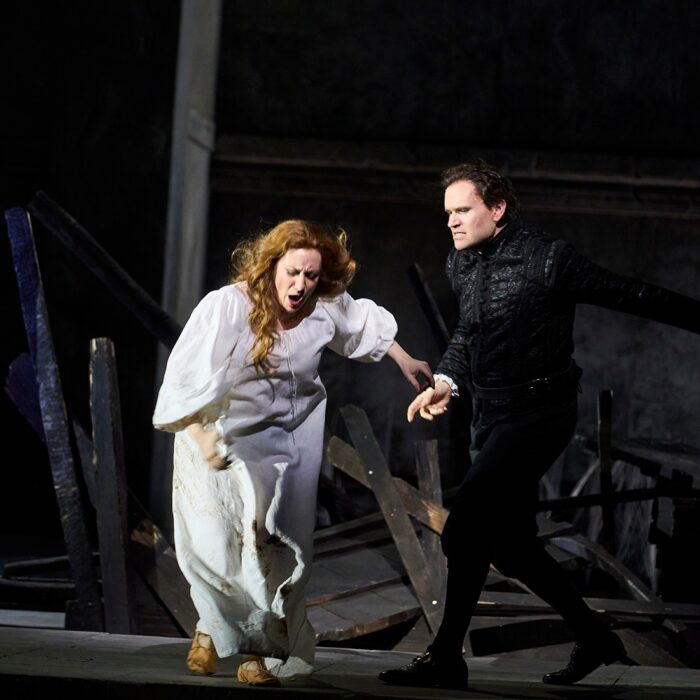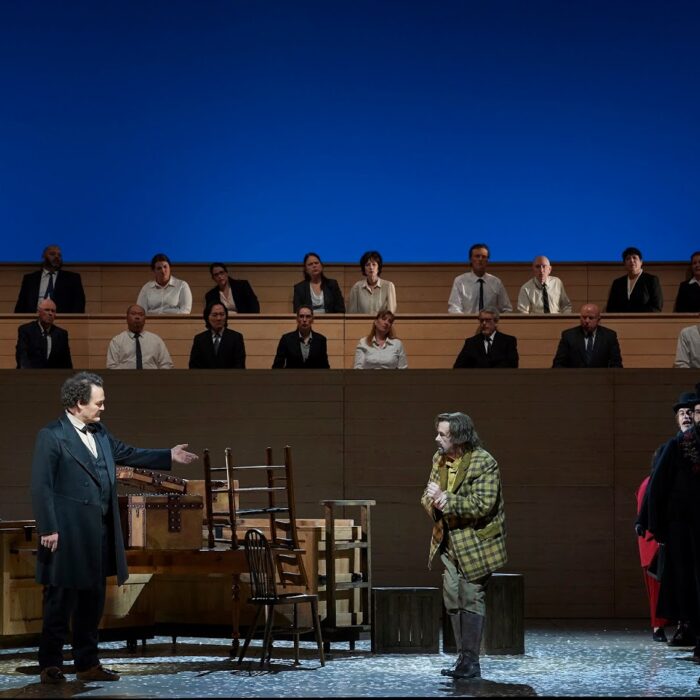
Opera Meets Film: ‘Wall Street’ As a Modern Retelling of Verdi’s ‘Rigoletto’
By David Salazar“Opera Meets Film” is a feature dedicated to exploring the way that opera has been employed in cinema. We will select a section or a film in its entirety, highlighting the impact that utilizing the operatic form or sections from an opera can alter our perception of a film that we are viewing. This week’s installment features Oliver Stone’s “Wall Street.”
At around the halfway mark of Oliver Stone’s “Wall Street,” we hear “Questa o quella” from Verdi’s “Rigoletto,” sung by the great Giuseppe Di Stefano. We are in Bud Fox’s recently re-designed kitchen as he cooks up a meal with his lover Darien. As the famed aria plays out, the two flirt, finish up their dinner preparations and then sit down to a meal together before engaging in sexual intercourse.
At this moment, Bud is at the height of his life under the villainous Gordon Gecko. He has achieved his goals of being rich and being with the girl he wanted.
He is living life large, like the Duke of Mantua, his morals thrown out the window in honor of his newly insatiable greed. He is breaking boundaries in his profession and potentially harming a lot of innocent people. As the text in the aria notes, “This one or that one,” it’s all the same to him. He is engaging in pleasure for the sake of pleasure, winning because he can. As Gecko clearly states later in the film, there is no goal except to just win and enjoy in the victory, the Duke of Mantua’s very own philosophy made manifest in the 20th century. “La Donna e mobile” might have been a more recognizable choice, but Stone clearly wanted the text of the aria itself to carry some sort of meaning for the captive listening.
An Unsettling Moment
But there is something quite sinister, like the Duke, at work in the choice of this piece, and opera in general, in this film.
For all of its two-hour runtime, we never hear anything resembling opera in the soundtrack. Moreover, we haven’t been primed for anything as melodic or bright in tone, as none of the non-diegetic music in the film approximates melody. And while the Duke’s buoyant and sunny tune lines up quite perfectly with the mood of the moment for the character and how the audience is intended to empathize with him, the music winds up being little more than a ruse, much like the lifestyle that Fox is living.
Even the context of the aria in the story world is ambiguous for the audience as we don’t even know if the segment is part of the diegetics of the scene or non-diegetic. Fox has a brief interjection in the middle of the aria, but we can’t really make out if he is singing something else or doing a terrible impersonation of Di Stefano. It all adds to the unsettling nature of the sudden inclusion of the aria.
Finally, bringing in the aria so suddenly and shifting in musical tone so radically creates the anticipation of something similar down the line. Furthermore, Stone doesn’t even give us the conclusion of the aria, abandoning it halfway and leaving the audience with a sense of incompleteness. We anticipate more of this effervescent quality later in the film, but we never get it, much like Fox won’t get more of these blissful moments.
The music, in both its content and its incorporation within the cinematic context, provides the story with its structure and meaning.
Digging Deeper
But there is even more at work here than just the content of the aria itself. While watching the film, it seemed obvious why the aria was picked, but only a superficial level. Stone could have picked a number of other selections from the operatic canon to highlight this tone or feeling. On deeper inspection, something became even clearer about how the simple insertion of this aria gave us a deeper understanding of the story and Stone’s own intentions.
The bottom line is this – the film is a modern retelling of “Rigoletto,” Bud Fox isn’t the Duke. He’s Rigoletto.
Much like the tragic jester, he’s reaping the benefits of being under the Duke / Gecko’s service. While Rigoletto openly mocks the other people of the Duke’s court, Fox is mocking the institutions of Wall Street as he surpasses all of his colleagues and undermines the system. But he does this all under Gecko’s control. Despite thinking that he has control like Rigoletto does throughout, he comes to learn that nothing is beyond Gecko and any attempt to cross him will result in his own annihilation.
While Gecko doesn’t rape or abuse Fox’s daughter the way the Duke does to Gilda, Rigoletto’s daughter, he does attack Fox’s father Carl by nearly destroying the company he has dedicated his life to. The result of Gecko’s transgression is that Carl winds up in the hospital from a second heart-attack, a death blow imminent.
While it might seem a bit strange to connect Gilda with Carl, it makes sense when you contextualize what they ultimately mean to the main character and how each one ultimately misunderstands those two. Gilda is shown as an innocent virgin who wants to grow up, something that Rigoletto fails to realize, ultimately creating mistrust and lies between the two. Carl tries to instill values of honesty and hard work in his son, values that Fox overlooks until it is too late for himself.
The Sparafucile character exists in the form of Sir Larry Wildman, who Fox aids in conning at the start of the film (Rigoletto spurns the murderer), before turning to him for support and help in a clandestine manner. While we are meant to believe that Wildman is “good,” the truth is that he is simply a “morally superior” version of Gecko. Rigoletto’s “Parisiamo” is actually quite apt for presenting the comparison between two men that essentially do the same thing using differing motives or masks to do it. While Gecko is outward in many ways about his morally baseless ways, Wildman purports to have righteousness that we can guess isn’t really all there.
The endings diverge a bit with Fox managing to hurt Gecko and save his father from a near-death experience, unlike Rigoletto, whose plan ultimately backfires and sees him tragically lose the one person he most loves – his daughter. Fox “beats” Gecko, but winds up losing his reputation in the process, the one thing he had at the start of the film and simply didn’t value enough.


